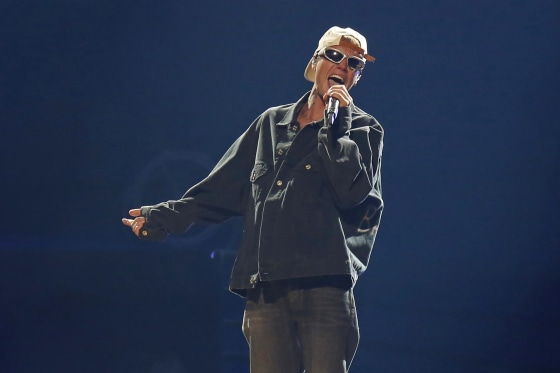The fiancée of the slain Saudi journalist Jamal Khashoggi has published an open letter in The Washington Post asking the singer Justin Bieber to cancel his performance at a Formula One race in Saudi Arabia.
In the letter, Hatice Cengiz urged Bieber to cancel his scheduled Dec. 5 performance in the Red Sea city of Jiddah to "send a powerful message to the world that your name and talent will not be used to restore the reputation of a regime that kills its critics."
Khashoggi's "brutal murder made headlines all over the world," Cengiz wrote. "Ever since, many human rights organizations and individuals, including myself, have been calling for justice and accountability."
Cengiz said she believed Bieber was traveling to Saudi Arabia to perform for his fans, but she encouraged him to think of those who have suffered at the hands of the government.
"I know that you are dedicated to your fans and are traveling to Saudi Arabia on their behalf. However, there are hundreds of Saudis, of all ages, backgrounds and religious beliefs, languishing in prison, punished for merely expressing their opposition to the merciless Saudi dictatorship of" Saudi Crown Prince Mohammed bin Salman, she wrote.
Bieber is one of several performers scheduled to appear at the Jiddah race, including the rapper A$AP Rocky, the DJs David Guetta and Tiesto and the singer Jason Derulo. Bieber is arguably the most famous of the group.
Some stars, like Nicki Minaj, have canceled shows after they came under public pressure, but others, like Mariah Carey, have gone ahead with performances since the death of Khashoggi, a writer and former government spokesman.
"Please know that your invitation to participate in a concert in Jiddah comes directly from MBS, as the crown prince is known," Cengiz wrote in her open letter to Bieber. "Nothing of significance happens in Saudi Arabia without his consent, and certainly not an event as important and flashy as this."
Khashoggi's stunning killing in 2018 was carried out by a team of 15 Saudi government agents who had been sent to Istanbul, where he had an appointment at the Saudi Consulate for documents he needed to marry Cengiz. She waited for him outside the consulate, but he never walked out. His body was never found.
The killing by agents who worked for the crown prince drew international outrage and cast a shadow over Prince Mohammed, whose reputation has never fully recovered. Prince Mohammed has maintained that he had no prior knowledge of the operation that killed Khashoggi. A U.S. intelligence assessment made public under President Joe Biden, however, determined that the crown prince approved the operation.
Bieber will open a world tour in February that was rescheduled from last year because of the coronavirus pandemic.
Since then, Saudi Arabia's state-owned sovereign wealth fund — steered by Prince Mohammed — scooped up shares in Live Nation, the company that owns Ticketmaster and promotes concerts for Bieber and other major stars. As Live Nation's shares plummeted last year during Covid-19 lockdowns and the cancellations of thousands of shows, the Public Investment Fund bought $500 million worth of shares in the battered company.
Public filings show that the Saudi wealth fund is now the second largest institutional holder in Live Nation, with a stake worth about $1.4 billion.
Human Rights Watch has also called on Bieber and the other performers to pull out of the Formula One concerts in Saudi Arabia, saying the events are aimed at "sportwashing" by diverting attention from and deflecting scrutiny of Saudi Arabia's human rights record.
Saudi youths are the main attendees of these concerts, enjoying the country's social changes, which allow for music and gender mixing. The kingdom's General Sports Authority argues that sports are a tool for social change in the kingdom.
Next month's F1 race will be the first premier sporting event hosted by Saudi Arabia; the kingdom has hosted the lesser-known Formula-E race in the past to raise its profile as a tourist destination.
At the time of Khashoggi's killing, the crown prince was being lauded for ushering in social reforms transforming life for many in the country. Khashoggi had been writing columns for The Washington Post criticizing the crown prince's brash foreign policy moves and simultaneous crackdown on activists and perceived critics, including women's rights activists, writers, clerics and economists.
Saudi Arabia held a trial for some of those involved in his killing, sentencing five of them to death before sparing them execution.



